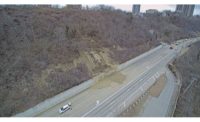Crews are close to completing a detour along a heavily traveled commuter route between Jackson, Wyo., and eastern Idaho where a section of the Teton Pass highway collapsed June 8. Officials hope to have the detour paved and opened to traffic this week, says Bob Hammond, resident engineer with WYDOT.
Jackson, Wyo.-based Evans Construction is finishing work to the subgrade and will soon start hauling in crushed base. Paving work will then take another day or two. “It’s pretty exciting [to be at this point so quickly],” Hammond says.
"I’m really impressed with how quickly Evans responded and has collaborated with us on the design,” Hammond says. “They understand how important this route is for the essential workers who travel it every day.”
The highway is a lifeline for commuters, deliveries, medical care access and tourism in the region, especially with limited alternatives and the onset of the summer season.
The new detour will feature a paved, bidirectional roadway with two 12-ft lanes. It will also have concrete barriers protecting motorists from any hazards, WYDOT says. The detour has been constructed on the interior of the existing road's curve, away from the unstable slide area. The detour will create a slightly sharper curve and steeper grade than before, and WYDOT plans to reduce the speed through the area to accommodate the grade and increased curvature.
“Through all our knowledge and experience, we believe this temporary road is in a safe location,” Hammond says.
Evans is supplying the project with the crushed base and is also the paving contractor, so the availability of labor and materials has not been an issue for the project and aided in the quick turnaround, Hammond says.
The contractor had quickly mobilized on June 7 to repair a crack and a drop in the road near mile marker 12.8 of SH-22 on Teton Pass. Under an emergency contract for WYDOT, Evans worked through the evening to remove asphalt from the roadway to minimize the weight on the unstable ground. Despite their efforts, the road was dropping about 6 in. per hour, says Craig Clarke, construction manager and vice president of Evans Construction.
“When we realized it was getting dark and we couldn’t proceed, we called it quits for the evening,” Clarke says. The crews moved the construction vehicles a safe distance away and went home. In the early morning hours of June 8, the roadway failed, “leaving a large cavern with a head scarp of about 50 straight vertical feet,” Clarke says.
No crew members were injured, and no equipment was damaged.
Hammond says the Evans crews have done “an excellent job with compaction,” and is confident the roadway is safe. WYDOT has started the process of working toward a permanent fix in a couple of months.
Governor Mark Gordon issued an executive order declaring an emergency in response to both the landslide at milepost 12.8 and an unrelated mudslide discovered June 7 at milepost 15. The declaration helped the state quickly access additional resources from the Federal Highway Administration to begin the substantial repairs required.
WYDOT was aware of the slide potential along the highway and had been regularly monitoring the road, especially as spring runoff had increased the erosion, Hammond says.
Constructed in 1969, the nearly 17-mile stretch of highway is regularly monitored for slides, says WYDOT spokesperson Stephanie Harsha. “We have a couple known slide paths in the area, so our geology team gets out there regularly to inspect those areas … especially with warming temperatures that cause snowmelt,” she says.
Yellowstone National Park and Grand Teton National Park remain open for visitors. WYDOT spokesperson Doug McGee says traffic along Teton Pass is, on average, about 12,257 vehicles per day at this time of year, heading into peak season for the parks. “That number is expected to climb to 15,146 vehicles per day in June and top out in July with more than 16,400 vehicles per day,” he adds.




